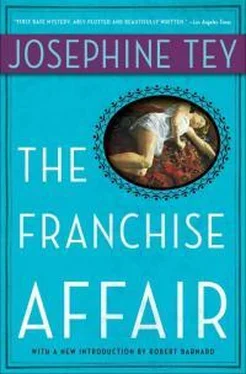So they drove out to the golf course in high spirits, and Robert decided that he would ask her to marry him when they were having tea in the club-house afterwards. Or would there be too many people interrupting here, with their kind words on the result of the trial? Perhaps on the way home again?
He had decided that the best plan was to leave Aunt Lin in possession of the old house – the place was so much hers that it was unthinkable that she should not live there until she died – and to find a small place for Marion and himself somewhere else in Milford. It would not be easy, these days, but if the worst came to the worst they could make a tiny flat on the top floor of Blair, Hayward, and Bennet’s. It would mean removing the records of two hundred years or so; but the records were rapidly arriving at museum quality and should be moved in any case.
Yes, he would ask her on the way home again.
This resolution lasted until he found that the thought of what was to come was spoiling his game. So on the ninth green he suddenly stopped waggling his putter at the ball, and said: “I want you to marry me, Marion.”
“Do you, Robert?” She picked her own putter out of her bag, and dropped the bag at the edge of the green.
“You will, won’t you?”
“No, Robert dear, I won’t.”
“But Marion! Why! Why not, I mean.”
“Oh – as the children say, ‘because.’”
“Because why?”
“Half a dozen reasons, any one of them good by themselves. For one, if a man is not married by the time he is forty, then marriage is not one of the things he wants out of life. Just something that has overtaken him; like flu and rheumatism and income-tax demands. I don’t want to be just something that has overtaken you.”
“But that is–”
“Then, I don’t think that I should be in the least an asset to Blair, Hayward, and Bennet. Even–”
“I’m not asking you to marry Blair, Hayward, and Bennet.”
“Even the proof that I didn’t beat Betty Kane won’t free me of being ‘the woman in the Kane case’; an uncomfortable sort of wife for the senior partner. It wouldn’t do you any good, Robert, believe me.”
“Marion, for heaven’s sake! Stop–”
“Then, you have Aunt Lin and I have my mother. We couldn’t just park them like pieces of chewing-gum. I not only love my mother, I like her. I admire her and enjoy living with her. You, on the other hand, are used to being spoiled by Aunt Lin – Oh, yes, you are! – and would miss far more than you know all the creature comforts and the cosseting that I wouldn’t know how to give you – and wouldn’t give you if I knew how,” she added, flashing a smile at him.
“Marion, it is because you don’t cosset me that I want to marry you. Because you have an adult mind and a–”
“An adult mind is very nice to go to dinner with once a week, but after a lifetime with Aunt Lin you would find it a very poor exchange for good pastry in an uncritical atmosphere.”
“There is one thing you haven’t even mentioned,” Robert said.
“What is that?”
“Do you care for me at all?”
“Yes. I care for you a great deal. More than I have ever cared for anyone, I think. That is, partly, why I won’t marry you. The other reason has to do with myself.”
“With you?”
“You see, I am not a marrying woman. I don’t want to have to put up with someone else’s crochets, someone else’s demands, someone else’s colds in the head. Mother and I suit each other perfectly because we make no demands on each other. If one of us has a cold in the head she retires to her room without fuss and doses her disgusting self until she is fit for human society again. But no husband would do that. He would expect sympathy – even though he brought on the cold himself by pulling off clothes when he grew warm instead of waiting sensibly to get cool – sympathy and attention and feeding. No, Robert. There are a hundred thousand women just panting to look after some man’s cold; why pick on me?”
“Because you are that one woman in a hundred thousand, and I love you.”
She looked slightly penitent. “I sound flippant, don’t I? But what I say is good sound sense.”
“But, Marion, it is a lonely life–”
“A ‘full’ life in my experience is usually full only of other people’s demands.”
“–and you will not have your mother for ever.”
“Knowing Mother as I do, I have no doubt that she will outlive me with perfect ease. You had better hole out: I see old Colonel Whittaker’s four on the horizon.”
Automatically he pushed his ball into the hole. “But what will you do?” he asked.
“If I don’t marry you?”
He ground his teeth. She was right: perhaps her mocking habit of mind would not be a comfort to live with.
“What had you and your mother thought of doing now that you have lost The Franchise?”
She delayed over her answer, as if it were difficult to say. Fussing with her bag, and keeping her back to him.
“We are going to Canada,” she said.
“Going away!”
She still had her back to him. “Yes.”
He was aghast. “But Marion, you can’t. And why to Canada?”
“I have a cousin who is a professor at McGill. A son of Mother’s only sister. He wrote some time ago to ask Mother if we would go out to keep house for him, but by that time we had inherited The Franchise and were very happy in England. So we said no. But the offer is still open. And we – we both will be glad to go now.”
“I see.”
“Don’t look so downcast. You don’t know what an escape you are having, my dear.”
They finished the round in a business-like silence.
But driving back to Sin Lane after having dropped Marion at Miss Sim’s, Robert smiled wryly to think that to all the new experiences that knowing the Sharpes had brought to him was now added that of being a rejected suitor. The final, and perhaps the most surprising, one.
Three days later, having sold to a local dealer what had been saved of their furniture, and to Stanley the car he so much despised, they left Milford by train. By the odd toy train that ran from Milford to the junction at Norton. And Robert came to the junction with them to see them on to the fast train.
“I always had a passion for travelling light,” Marion said, referring to their scanty luggage, “but I never imagined it would be indulged to the extent of travelling with an overnight case to Canada.”
But Robert could not think of small-talk. He was filled with a misery and desolation that he had not known since his small soul was filled with woe at going back to school. The blossom foamed along the line side, the fields were burnished with buttercups, but the world for Robert was grey ash and drizzle.
He watched the London train bear them away, and went home wondering how he could support Milford without the hope of seeing Marion’s thin brown face at least once a day.
But on the whole he supported it very well. He took to golfing of an afternoon again; and although a ball would always in the future be for him a “piece of gutta-percha,” his form had not seriously deteriorated. He rejoiced Mr. Heseltine’s heart by taking an interest in work. He suggested to Nevil that between them they might sort and catalogue the records in the attic and perhaps make a book of them. By the time Marion’s goodbye letter from London came, three weeks later, the soft folds of life in Milford were already closing round him.
My very dear Robert (wrote Marion)
This is a hasty au revoir note, just to let you know that we are both thinking of you. We leave on the morning plane to Montreal the day after tomorrow. Now that the moment is almost here we have discovered that what we both remember are the good and lovely things, and that the rest fades to comparative insignificance. This may be only nostalgia in advance. I don’t know. I only know that it will always be happiness to remember you. And Stanley, and Bill – and England.
Читать дальше
Конец ознакомительного отрывка
Купить книгу












